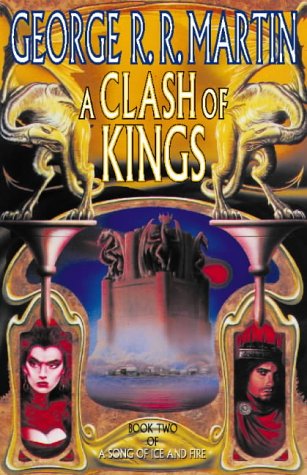A Week of Ice and Fire, Day Two!

A Clash of Kings is a good book, and, while it delivers on most of the promises of A Game of Thrones' explosive ending, it makes a point of emphasising the fantasy roots of the series and is significantly less pleasant all around in its developments.
Contains spoilers for A Game of Thrones
Civil war has broken out in the Seven Kingdoms, with five men proclaiming themselves king above all others. Tyrion tries to keep King's Landing running smoothly while having to deal with the temperamental and stupid new king and the infernal Cersei. Sansa has to suffer the humiliations of being betrothed to her father's murderer, while Arya attempts to run as far as she can under a series of pseudonyms.
One of the pretenders to the throne, Stannis Baratheon, has taken up a new religion – much to the consternation of Davos, his most trusted onion knight. Catelyn tries desperately to
Beyond the Wall, Jon begins his rangings in search of the Others and news of Benjen Stark.
Across the sea, Daenerys and her newborn dragons travel the red waste so that they may find a new army to take on Westeros.
Returning to the Iron Islands after many years away, Theon Greyjoy gets ideas significantly above his station.
It is worth noting that, with much of the world at war, no one but the Lannisters has much fun in this book. There's not a lot of relief, not even for Tyrion, who has to deal with a truly ghastly council, the worst possible king and, above all, his sister. Fortunately, most of it is compelling if not at all nice.
With the birth of three dragons in the dying moments of A Game of Thrones, a door has opened and magic has spilled back into the world. The dragons' rise coincides with an ominous red star appearing in the sky and the increasing popularity of the religion of the Lord of Light. Magic is not portrayed as an entirely convenient workaround, but it does feel sometimes almost like cheating.The best antidote for now is the healthy scepticism bred amongst the more sensible characters.
"Sorcery is the sauce fools spoon over failure to hide the flavour of their own incompetence.â€
The man most poised to witness the reality of magic, Ser Davos, initially struck me as too far removed from the situation to be of any help. Realistically, he is the only person within Stannis' camp worthy of having dedicated chapters: completely immune to new ways, completely opposed to the lickspittle ways of countless yes men, Davos is capable of providing a properly objective account of the developments at Dragonstone. The light he sheds on Melisandre and her religion is frustrating in its vagueness and brevity, but this is a mystery that would be disappointing if it came out too soon. While Davos does not yet get his best chance to be much more than an outlet for exposition, he has enough promise to become a good character in his own right.
A bad character, but in all the right ways, is Theon Greyjoy. Put plainly, he sucks. This is Martin's first straight up villainous POV character. Tyrion and Daenerys may have interests that run counter to the majority of the "good†characters, but they're not creature of malice. A fairly innocuous character in A Game of Thrones, Theon's inner monologue reveals that he was actually a loathsome sod all along. Theon is Martin's Trojan Horse, and one of many carefully planted time bombs festering since the series began.
Theon is also the perfect complement to Davos because they both introduce belief systems totally other to those examined earlier. Where Davos was unfamiliar with R'hllor, Theon is someone who is both intimately familiar with the workings of the Iron Islands and near fatally ignorant of how a society can continue without him. Martin has carefully disguised most of his exposition through the combination of events (the Seven artfully through naturally occurring and contextually important visits to a Sept) and introductions (Davos wondering what the hell is going on with all of this Lord of Light malarkey).
Most all of the storytelling feels natural and unstilted, and here is where Martin begins to build up the momentum of chapter cliffhangers and multiple story feints; you can never quite tell if what you've just read has actually happened or if Martin's pulling some kind of trick. He uses this technique sparingly but enough to suggest that nothing can be taken at face value. It's a good tactic, and there are key passages that are thrilling in their own right and not just for the promises that they make.
Daenerys, isolated as always, has some of the most evocative sections – and the most obviously fantastic. Given that the young queen travels everywhere with three dragons draped over her, this is easily forgiven. The overt mysticism of the lands beyond the Seven Kingdoms serve as another stark contrast, and these are places where no one is given cause to doubt anything that their eyes perceive has the potential to be real. While I'm always going to be a booster of the Daenerys storylines, I will admit that I mainly bring her up simply so I can emphasise that this book includes the following sentence:
"Ghost grass grows in the Garden of Gehane, phantom tortoises have been seen carrying messages between the windowless houses on Warlock's Way, and all the rats in the city are chewing off their tails.â€
If you don't think that phantom tortoises are the coolest things ever, then I just don't know what to do with you. But it's for moments like these, big and small, that I read these books. Martin does not just provide compelling characters and damnably fast moving plots packed with unpleasantness, he ensures that his world feels real. Rather than a series of impressive set pieces, the atmosphere ensures that Westeros is truly inhabited.
While the political machinations are probably more overt than A Game of Thrones, and the main story is interesting, most of the pleasures from this book come from the characters disengaged from the main plot; the introductions of the Crannogmen and the concept of the warg give Bran something to do, and Jon Snow ends on a sweet note as always, while Robb simply isn’t that interesting a character, especially when filtered through the lens of Catelyn. A Clash of Kings travels at a fast pace but it feels more like a bridging novel rather than a novel in its own right. I'm going to admit that I've cheated: I've read A Storm of Swords and I can promise you that it's a right cracking good novel, and it builds on everything that this one had going for it.


